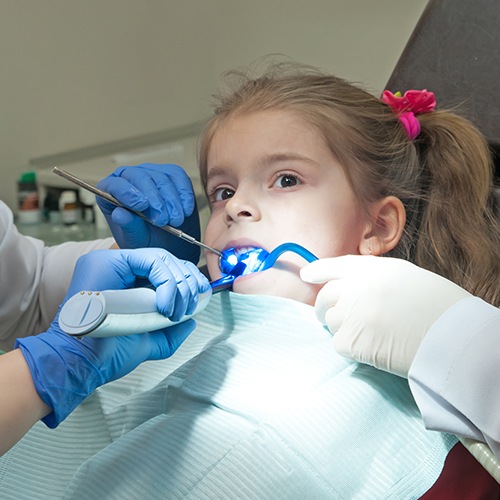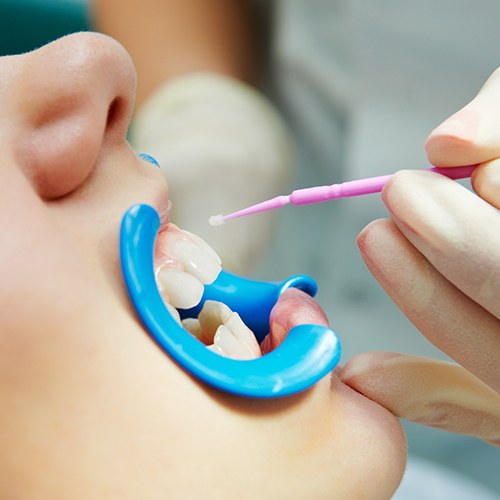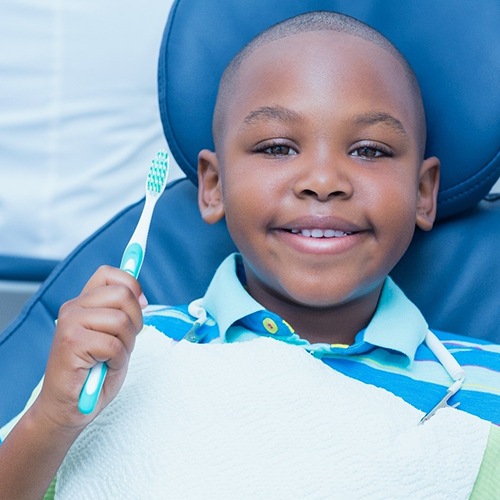Preventive Dentistry – Levittown, PA
We Make Proactive
Dental Care a Priority
According to the American Academy of Pediatric Dentistry, children should be seen by a dentist twice a year. During these visits, Dr. Amar performs a detailed examination of the teeth, gums and other important oral structures. They can also expect a thorough cleaning and fluoride application to keep their teeth feeling clean and protected! With routine preventive care and the right personalized treatments, their smile is sure to stick with them well into adulthood! We can’t wait to meet your family, so don’t wait to call Happy Teeth Pediatric Dentistry and Orthodontics for your child's first visit for a dental checkup, teeth cleaning, and preventive dentistry in Levittown, PA today!

Why Choose Happy Teeth Pediatric Dentistry and Orthodontics for Preventive Dentistry?
- Only Board-Certified Pediatric Dentist in the Levittown Area
- Silver Diamine Fluoride Applications Available
- Varying Strengths of Sedation Dentistry Provided
Dental Sealants

When your child is still practicing their brushing and flossing at home, their teeth (especially their molars and premolars) can be at higher risk of developing cavities. Thankfully, durable dental sealants from our dental office work to protect these teeth as they get used to practicing at-home care. By painting a thin coating of composite resin over the chewing surfaces of teeth, we can provide up to 10 years of protection from food particles, plaque and bacteria and reduce the risk of cavities moving forward.
Non-Nutritive Habits

At a young age, your child may still retain habits that can actually harm their oral development. These non-nutritive habits include thumb-sucking, finger-sucking, tongue-thrusting or relying on a pacifier past two years of age. Dr. Amar is highly experience in helping children break these habits, ensuring they maintain a healthy oral development as they age. If you need advice on managing your child’s non-nutritive habits at home, Dr. Amar and his team are more than happy to help your family every step of the way.
Fluoride Treatments

Fluoride is one of the most important minerals both at a young age and as an adult. It can be found in public drinking water and the foods we eat, but one of the reasons it’s found in so many oral care products is because of just how effectively it strengthens and protects tooth enamel. Following a dental cleaning, we’ll apply a small amount of fluoride gel to the teeth directly, ensuring that your child’s teeth stay well-protected by their next visit.
At-Home Dental Care

Considering we only ask you to visit our dental office twice a year, at-home care is a very important part of preventive care for your family. With that said, we understand that it can be difficult to know for sure which products will best meet you and your family’s oral health needs. Dr. Amar and his caring team will recommend products that they believe will best suit your needs, whether it’s a toothbrush, brand of toothpaste or other oral care product designed to make your child’s daily routine easier.
Dental Checkups & Teeth Cleaning FAQs

At Happy Teeth Pediatric Dentistry and Orthodontics, Dr. Singh and Dr. Shah want your child to have the best possible experience. When visiting our office for a general checkup and cleaning, we understand your little one may feel unsure or scared. We also know you may have many questions about how things are done and why. To provide a clearer understanding of what you and your child can expect, we’ve compiled some pediatric dentist FAQs and children’s dentist FAQs below. If you do not see your question listed, please do not hesitate to contact our office. We’re here to provide the answers you need to make the right decision about your child’s oral health.
What is the difference between a pediatric dentist and a family dentist?
In your search for the right dental professional for your child, you likely found many articles explaining the benefits of seeing a family dentist. However, when it comes to identifying and treating young children, a pediatric dentist can prove to be more beneficial. Here’s why:
Pediatric dentists must undergo additional training. Specializing in the treatment of children and the stages of tooth eruption and facial development, they understand what steps must be taken to ensure optimal oral health as a child transitions into adolescence and eventually, adulthood. Dr. Singh is a board-certified pediatric dentist who is here to provide your child with exceptional care from infancy through adolescence.
Which foods should my child consume to ensure a healthier smile?
Obviously, children are going to want candy, chips, and cookies from time to time. While these are fine in moderation, they should not be part of a normal daily diet. If you want them to maintain good gum health, stronger tooth enamel, and an overall pleasant aesthetic, it’s best to incorporate leafy greens, fruits and vegetables, dairy, and lean proteins. Breads and cereals are fine as well but you should be mindful of how much they consume each day. By limiting starches and sugars, you can reduce the risk of tooth decay, cavities, and gum disease at an early age.
When should my child be able to brush their teeth?
Each child is different, but it is not uncommon to continue helping your little one take care of their smile until they are at least 7 or 8 years old. Brushing and flossing skills and techniques can take time to develop. Over the years, you will need to monitor their habits and help them refine their technique, making sure they can clean even those hard-to-reach areas of their smile. You can even ask Dr. Singh or Dr. Shah about helpful tips that will encourage your child to take on the task themselves once they reach a certain age.
Why are dental X-rays important?
When learning that your child needs dental X-rays, you may worry that they are unsafe and unnecessary. Before you adamantly protest this necessary part of their visit, you must first understand that the X-ray systems used today are vastly different than those of 20 or 30 years ago. Nowadays, Dr. Singh and Dr. Shah use all digital X-rays that emit up to 80% less radiation. Not to mention, the images captured are clearer and allow for more accurate treatment planning. This part of your child’s general checkup and cleaning visit is necessary because it allows us to see what is happening beneath the gum line. Because tooth decay and infection can develop in areas unseen by the naked eye, these images make it possible to address problems before they have the chance to worsen.
